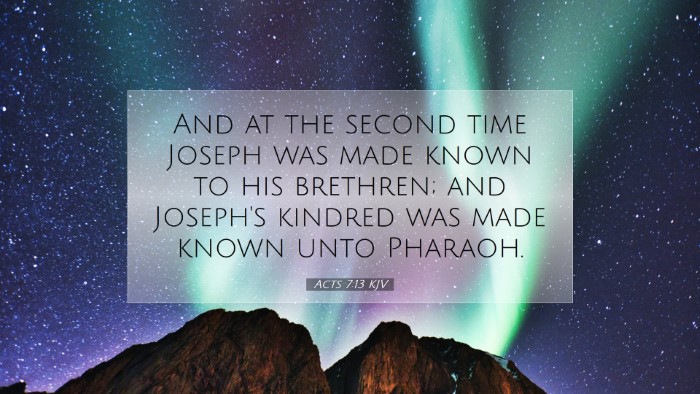Acts 7:13 - Commentary Insights
Verse Context: Acts 7:13 states, “And at the second time Joseph was made known to his brethren; and Joseph's kindred was made known unto Pharaoh.” This verse encapsulates a pivotal moment in the story of Joseph, illustrating themes of revelation, reconciliation, and divine providence.
Overview
This verse occurs within Stephen’s address before the Sanhedrin, where he recounts the history of Israel. He uses the story of Joseph to emphasize how God’s plans often unfold in unexpected ways and how they lead to significant revelations. The remembrance of this event serves as an illustration of God’s providence in the narrative of salvation history.
Commentary Insights
1. Historical Context
Matthew Henry provides an extensive overview of the historical background leading to this moment. He emphasizes that Joseph, favored by his father Jacob, was sold into Egypt—a situation that appeared grim but was used by God for great purposes. In God's timing, Joseph’s true identity and the familial connection became known, facilitating a reunion that was both emotional and significant.
2. Theological Considerations
Albert Barnes notes that Joseph’s story contains profound theological implications. The reinterpretation of his identity assures that God can use even betrayal for His glory. This highlights God’s sovereign will and His ability to weave complex life events into the fabric of divine purpose. Joseph’s rise to power after being wronged serves as a prefigurement of Christ's own journey—a narrative that encourages believers about hope amidst trials.
3. Reconciliation and Restoration
Adam Clarke points to the motif of reconciliation present in this verse. The reintroduction of Joseph to his brothers is steeped in the themes of forgiveness and restoration. Joseph, who previously experienced abandonment, can now facilitate the well-being of his family. This aspect underscores the essential Christian principle of redemption and the importance of mending broken relationships.
4. Divine Providence
The importance of divine providence is a key theme in this narrative. The varying circumstances—Joseph's sale into slavery, his rise to power, and ultimately the reunion—illustrate a divine orchestration that believers are encouraged to trust. Matthew Henry notes that this scripture serves as a reminder that God’s plans may manifest in ways that are not immediately understandable, yet they are always aimed at a greater good.
5. Typological Significance
In the typology of Scripture, Joseph represents Christ. Barnes emphasizes that just as Joseph revealed himself to his brothers after suffering betrayal, Christ will reveal Himself to His people, following His sufferings. This typological interpretation enriches the understanding of salvation history and the unfolding of God’s redemptive plan through Jesus.
Practical Applications
- Emotional Healing: As Joseph was reconciled with his brothers, so too believers are called to pursue reconciliation in their relationships, demonstrating the healing power of forgiveness.
- Hope in Adversity: This verse teaches the faithfulness of God in hardship. Pastors and theologians should encourage the congregants to look for God's hand in their own struggles, recognizing that struggles can lead to greater victories.
- God’s Sovereignty: Understanding that God’s plans are often realized through unexpected circumstances can provide reassurance for those studying the nature of God's will in their lives.
- Encouragement for Ministry: Like Joseph, believers are often placed in positions to serve others, especially as a result of their trials. This verse emphasizes the calling to be instruments of God’s grace.
Conclusion
Acts 7:13 serves as a powerful reminder of God’s sovereignty and His ability to bring about reconciliation and restoration. It is a profound statement about God’s redemptive work in the world through individuals who may have faced significant personal trials. For pastors, students, and scholars, this verse is not just historical but deeply theological, calling for reflection on the nature of God’s providential plan and its implications for modern faith. As noted by Henry, Barnes, and Clarke, the narrative of Joseph offers timeless lessons in forgiveness, faith, and divine appointment that remain relevant to the contemporary believer.


